January 15 - 21, 2012: Issue 41
Ah Me-The Beauties Of Nature!
By JUDY TUDOR
BETWEEN the ropes of the tent peeked the blue Pacific, and a golden, sandy crescent of perfect beach. Giant combers broke off-shore in swirls of turquoise shot-silk and lacy frills. A white yacht dipped her sails to the nor'easter; a smudge of freighter smoke broke the long line of horizon. To the left, old Barrenjoey-a solid bulk of brown-green-black, a broth of breaking sea at her feet, and the pygmy figures of the rock-fishermen already at work. Across the isthmus, Pittwater shone like a blue jewel in a setting of green hills. Over all, the morning sun shed a bland munificence.
The time-sometime between Christmas and New Year: the place-Palm Beach camping reserve; the spot, the water queue, which in order of the day's chores came after the bread and milk queues. "Just like home." said one woman.
SEVERAL months ago, I, with the help of a car, a month's ration of petrol, and several friends, hauled a war-stranded caravan onto the sandy Isthmus at Palm Beach; it made a good week-ender. Down below was the regular camping area. grass grown, level, sheltered, but populous with permanent week-end campers. Like the Garbo, but for slightly different reasons, I wanted to be alone in my contemplation of nature, and took all the howling winds that blew, all the salt-sea spray of the sandy dune-strip rather than that regular camp. From the caravan windows: fore, was the. limitless Pacific, aft. blue Pittwater.. A kindly belt of scrub screened the campers from below, and although civilisation was just over the brow, there-was sufficient of splendid Isolation to please anyone who had an unholy desire to get Pitt Street out of the lungs and fellow humans out of the hair at regular intervals.
That was In October. In November, they (meaning some authority, municipal, shire, or governmental), came with a tractor and went to work. The carefully nurtured marun grass and other sand-growing shrubs were wrenched ruthlessly from the sandhills they helped bind together; the tips of the dunes were scraped down into approximate levelness; and hundreds of brand-new numbered pegs were driven at Intervals of a few feet Into the now loose, shifting sand. The scene was set for them to carn ten shillings per campsite per week from Christmas campers. (Or any camper between December and Easter; 3/ at other seasons.)
BY Christmas Eve, the once deserted dune-strip, with its car-width, of solid road, was covered thicker than a rash with everything in the way of canvas, and here and there a caravan was pushed adventurously on to semi- solid pockets in the loose sand. Tent ropes interlaced; and should the baby howl, papa snore or mama cough, then six neighbours close-packed around were Intimately aware of it. Family altercations were heard ten tents distance. The top water tap was almost within the portals of one tent; a portable washstand, festooned with tooth-brushes and pieces of soap, had to be negotiated before you could draw water. In and about this mushroom canvas-town, hundreds of people, in the sacred cause of holiday, had their temporary being. The fastidious might call it squalor, but the hardy spirits apparently called it fun.
Some campers came in huge lorries and brought literally everything from incredibly ancient grandparents to ice chests, carpets to lay on the sand, electric lighting outfits, wooden bedsteads, wardrobes, radios, and the kitchen stove. Some did it the hard way, with no more equipment than could be packed into a swag, candles for illumination, and a square of canvas to crawl beneath.
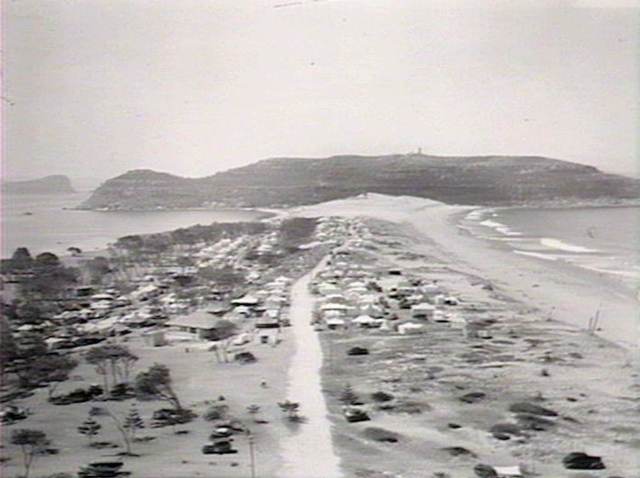
Above: Palm Beach, Government Printing Office 1 – 36503, No. d1_36503 Courtesy State Library of NSW, Date of Work; 12/1946
The men fished, swam, tightened tent ropes, and employed themselves in male fashion; the children-well it was "nice for the kids"; but the women toiled interminably, cooking food over open fires, stifled by smoke, harried by wind. They washed babies and baby clothes; minded children, shrilled at children, stood In long patient lines for essential services, and probably spent a great deal of time wondering why In the name of Christmas they had left their suburban dwellings with gas, electricity, and fences to keep the youngsters nicely corralled, for, that wilderness of discomfort, overmuch fresh air, sand, and wind without end, which, far from embracing the beauties of nature, provided about as much privacy as camping In Martin Place; and where all the personal bodily functions of one's, fellows are forced upon one in a manner no village of primitive natives would suffer for a moment.
SUCH a life is guaranteed to stamp from anyone with a millionth grain of individualism, all desire to lead a life communal. Strange figures loom up in doorways-your doorway. Or they stalk majestically out of the bushes, you might reasonably regard as your private property. You wait in Queues at the tap (for water), at the shop (for milk, bread, groceries), and at the showers. Australians whom I thought would never come at it have been brow-beaten by war into queue mindedness.' So much so that they even accept a holiday on the queue plan with equanimity.
But camping en masse sharpens your sense of humour-or else, without that God-given gift of being able to see the amusing, life is just too terribly tough. Walking into your neighbour's pile of fish scales with your bare feet is apt to send you Into a fit of fury; the man who (you feel) has deliberately blocked your means of exit with his two-ton truck and with whom you have already exchanged some unpleasant remarks, turns from being just a suburban carter in festive mood to a devil incarnate whom it would be pleasant to brain with the tomahawk. The fat woman some tents down, with the hairy legs, who insists upon wedging herself into a fiery-red sun-suit, becomes a personal affront. Worst of all you realise that the joke is on you, and that your desire to get away from it all for the Christmas break, has landed you in the same I company you have been keeping In the Bondi bus or Manly ferry for the other 51 weeks of the year. It is a shattering thought. There is no health in it.
“It’s the working man’s only chance of a holiday." said the outsize philosopher to whom I remarked that life In a lonely desert might be fun. "Thems that don't like it, done ‘atta come.”
True, brother, true. But I still have to have more proof than that, that the Australian spirit has shrunk as small it is accommodated from choice in a ten foot square of camping area, magnanimously allowed it by any local authority. Sandwiched between the interests who boost all habitable seaside land in Australia to ridiculous figures quite beyond the reach of the man who earns a modest living and supports' a family; and the minority-manoeuvred opinion of the so-called masses who regard any desire to be different as rank heresy, my philosopher was probably right In that the working man has little choice. But that the Australian on his day off or on his holiday can be happy, proves not so much that he is pleased with what is available as that he has a soul that can soar above his environment.
Ah Me—The Beauties Of Nature!. (1945, January 13). The Sydney Morning Herald (NSW : 1842 - 1954), p. 8. Retrieved from http://nla.gov.au/nla.news-article27926248
Visit Palm Beach Camping History in Barrenjoey Boat House history page
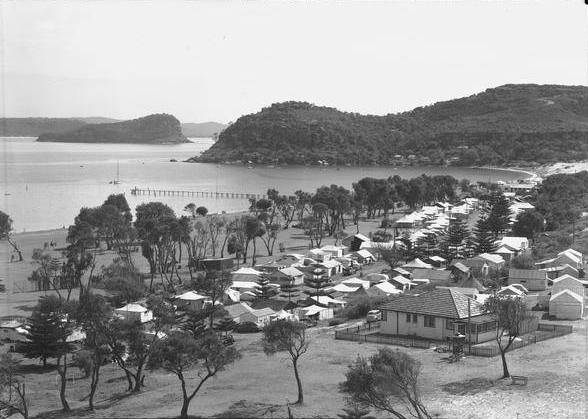
Above: Palm Beach camping reserve [Sydney] between 1910 and 1962, nla.pic-an23125315 by Frank Hurley, 1885-1962. Courtesy National Library of Australia
Below: Close Up of Barrenjoey (Palm Beach) lighthouse 2011.
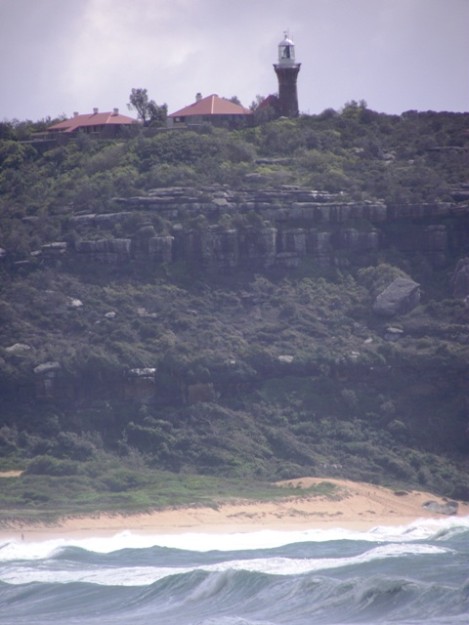
RECORD CROWDS. BEACHES THRONGED.
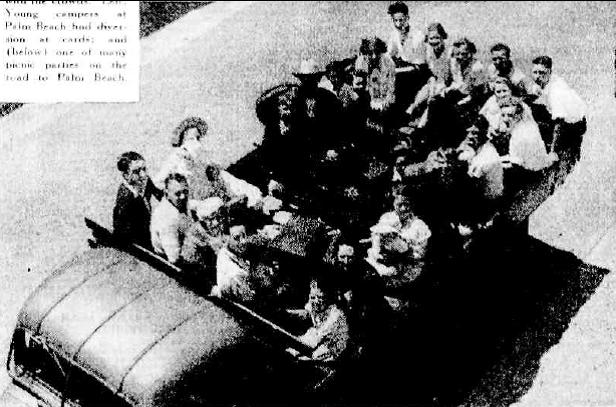
Trunks Generally Favoured by Bathers.
More than 100,000 people visited Sydney beaches yesterday. Five out of every six men bathed in trunks, in spite of regulations, and thousands of people travelled from their homes, on buses and trams, in shorts or playsuits over bathers, and dispensed with dressing sheds.
Figures for all beaches, based on turnstile figures at Coogee. Bondi, and Manly, where attendances reached record figures, were as follows:
Bondi . 30.000 Manly . 27,000 Coogee . 15,300 Bronte . 9,000 Clovelly . 8,000 Nielsen Park . 12,000 Balmoral . 9,000 Maroubra . 6,000 Palm Beach. 4,000 Newport 4,000 Deewhy . 4,000 Collaroy . 5.000 From the point of view of styles In beach wear and beach customs, the day set a new standard in modernity.
THE SPEED LIMIT.
The 30 mile an hour speed limit did not apparently inconvenience the traffic to and from the beaches. Motorists in general seemed i to be travelling at the usual pace.
Clear skies and a fresh breeze early in the morning roused people from their beds, eager to get down to the beaches before the weather changed. Most of the beaches close to the city were crowded early in the morning. By II 'a.m. a steady stream of traffic was beginning to move out to the farther beaches.
PALM BEACH POPULAR. Palm Beach was a popular goal for holiday-makers. Its usual holiday population of house parties was amplified this Christmas by an even larger 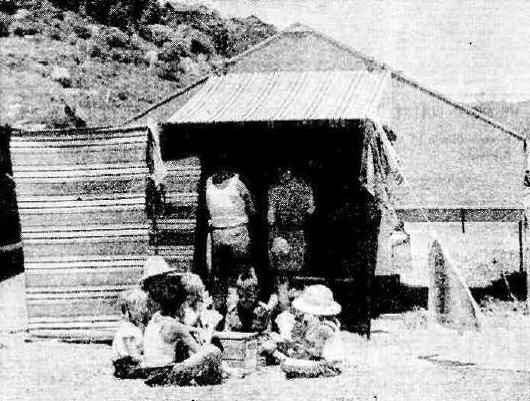 colony of trailers and camping motorists. Every site on the camping reserve was occupied. Some of the trailers and caravans were of remarkable design.
colony of trailers and camping motorists. Every site on the camping reserve was occupied. Some of the trailers and caravans were of remarkable design.
The scene, with the surrounding green country, the rich coloured sand, the gay parties of sunburnt people in bright swimming costumes under rainbow sunshades, and the background Of white and blue surf, was like something out of a well-produced revue.
Here, one felt, the holiday was more than a chance to Iie in the sun and swim in the surf. It was a fashion parade as well, and it was Sydney's first massed gala parade In the world's most, modern costumes.
ROLLICKING SURF.
By midday a brisk breeze had worked up a rollicking surf all along the coast. Rubber floats were at a premium. All the morning at Palm Beach, Newport, Avalon, and Deewhy, a steady Stream of traffic kept bringing more surfers. They arrived in every form of conveyance; there was even an odd sulky here and there on the road. There were several open lorries, their rattling boards populated by families out to have a good time at any price. There were cyclists by the hundred. Motor cycles flashed through the traffic with girls in shorts bouncing on the pillions. There were cars that could hardly crawl up the hills filled to capacity with family parties and everybody's luggage strung on the back. There were sleek, high-powered cars dashing In subversive spurts of 60 miles an hour through the 30-mile speed limit areas.
RECORD CROWDS. (1937, December 27). The Sydney Morning Herald (NSW : 1842 - 1954), p. 7. and p.10 photographs: (Titles: Young Campers at Palm Beach had diversion at cards and Above: one of many picnic parties on the road to Palm Beach) Retrieved from http://nla.gov.au/nla.news-article17439253
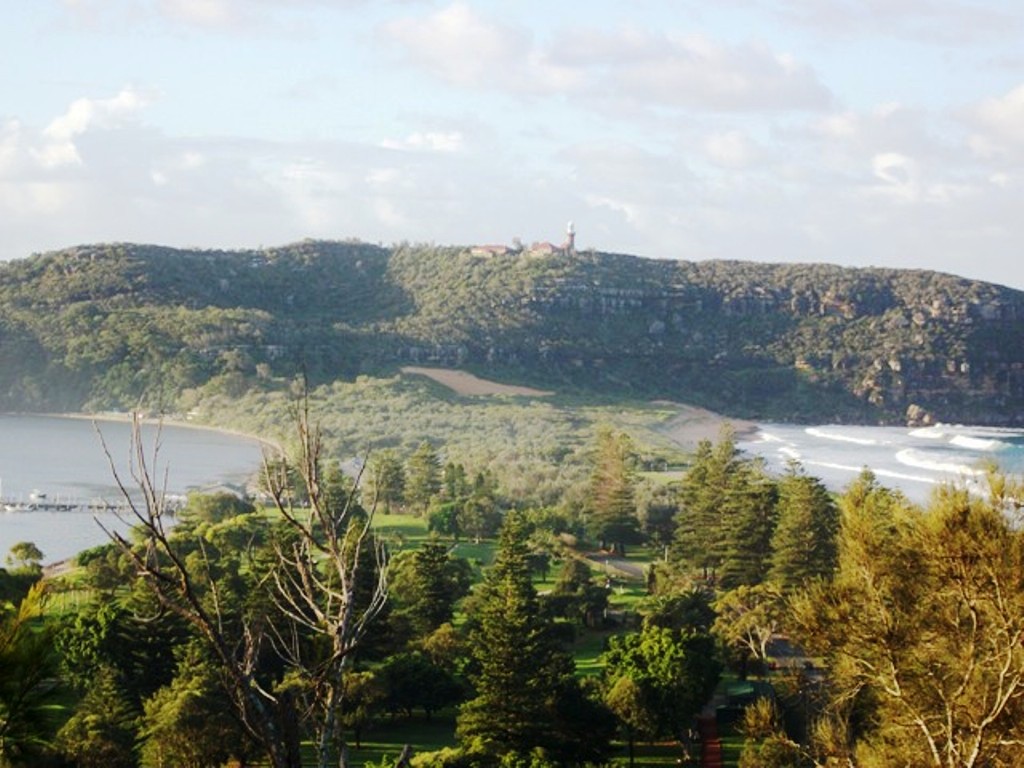
Palm Beach reserve area in 2012 at dusk. A J Guesdon picture.